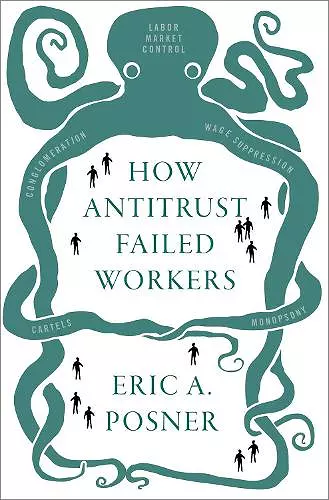How Antitrust Failed Workers
Format:Hardback
Publisher:Oxford University Press Inc
Published:18th Nov '21
Currently unavailable, and unfortunately no date known when it will be back

A trenchant account of an unacknowledged driver of inequality and wage stagnation in America: the abandonment of antitrust law, which has allowed corporations to combine into a smaller number of massive conglomerates whose market dominance robs workers of their bargaining power. The consequences of the massive consolidation wave in corporate America that began decades ago are now increasingly apparent: labor markets are no longer competitive. Since the 1970s, Americans have seen income and wealth inequality skyrocket--and job opportunities stagnate. There are many theories of why this happened, including the decline of organized labor and the introduction of tax policies that favored the rich. However, another crucial event was the precipitous decline in antitrust enforcement that began in earnest during the Reagan administration. With ever-increasing combination and consolidation, workers had fewer options to turn to. In How Antitrust Law Failed Workers, Eric Posner documents the role of antitrust in our economy and why it failed. Only through reforming antitrust law can we shield workers from employers' overwhelming market power. As Posner explains, antitrust laws were created to protect the labor market by attacking monopolies, like Facebook and Google today, that are able to either charge high prices or degrade the quality of their services because customers cannot switch to competitors. Antitrust laws are also used to attack business cartels that can fix prices. In recent years, it has become clear that firms with market power not only charge higher prices; they also suppress wages and output. Many employers use anticompetitive devices--like covenants not to compete for workers and no-poaching agreements--to advance their market power at the expense of workers. Posner shares stories that illustrate how the problem is playing out on the ground, and then contextualizes what is going on via a concise history of the American economy and labor relations since the 1980s. Essential reading for anyone interested in fighting economic inequality, How Antitrust Failed Workers also offers a sharp primer on the true nature of the American economy--one that is increasingly uncompetitive and tilted against workers.
In his timely and important book, University of Chicago law professor Eric Posner provides a comprehensive account of antitrust's failure to address employer consolidation and various anticompetitive methods to suppress wages. * Asher Schechter, ProMarket *
... elegantly argued work... provides useful ideas for dealing with the antitrust hurdles impacting the labor sector. * Claude Marx, FTC Watch *
A tight, progressive reasoning for the exercise of antitrust labor market protection. * Kirkus *
This important book develops the 'new learning' about labor market power. The returns to capital and those to labor have diverged sharply, reducing labor's participation rate in business profits. One reason is that labor markets are smaller than we once thought, giving employers more power to suppress wages. As Posner explains with clarity and force, antitrust has too often looked askance when confronted with anticompetitive practices targeting labor, such as overly aggressive noncompetition agreements, franchise restraints on worker mobility, and mergers that put downward pressure on wages. An important read for anyone interested in policy concerning competition, labor, and economic equality. * Herbert Hovenkamp, James G. Dinan University Professor, University of Pennsylvania Carey Law School *
Antitrust law has long turned a blind eye to the role of employer market power in slow wage growth and growing inequality. Eric Posner provides a much-needed corrective with his compelling, comprehensive and carefully reasoned documentation of the failures of the current system. More importantly, Posner lays out a reform agenda to address everything from outright collusion in wage setting to noncompete agreements. This book should be required reading for anyone who wants to understand the problems with American labor markets or is seeking to fix them. * Jason Furman, Former Chair Council of Economic Advisers and Professor of the Practice of Economic Policy, Harvard University *
Recent decades have seen a big shift in the balance of power in the job market away from workers and toward big employers, and it has contributed to the rise in inequality. Posner explains how antitrust policy might have helped prevent it and reduce inequality. Antitrust fights anticompetitive practices that harm consumers and it could fight anticompetitive practices in the job market that harm workers the same way. The book melds the new economic thinking on the topic with Posner's keen legal insight in an accessible way. * Austan Goolsbee, Former Chairman of Council of Economic Advisers and Robert P. Gwinn Professor of Economics, the University of Chicago Booth School of Business *
- Winner of Selected as one of the Best Political Economy Books of 2021 by ProMarket.
ISBN: 9780197507629
Dimensions: 152mm x 239mm x 23mm
Weight: 476g
224 pages